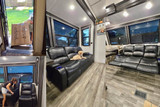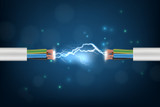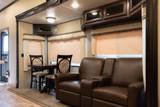Maintenance Tips For RV Solar Panels
A solar panel is an excellent upgrade for every camper's recreational vehicle, especially those who love boondocking. This upgrade can allow RVers to run all the essential devices in their RV, making it feel like a real house without the high cost, smell, or noises of a propane generator. And as long as you are camping in a place with direct sunlight, you will never have to worry about the batteries running out or having low generator fuel in the middle of the night. Therefore, you can have fun with your loved ones and still protect the environment by lowering your carbon footprint.
Solar panels have no fuel filter that has to be replaced or moving parts that wear out, but their efficiency can be reduced without proper care. Therefore, RV solar panels require little maintenance to keep them functioning at 100% every time you go camping with family members and friends. So here are a few crucial maintenance tips for solar panels on RVs:
5 Maintenance tips for RV solar panels
1. Solar Inverter Maintenance
Inverters are way more technical than the panels and can be very confusing for an average RVer. The inverter's high voltage and electrical components can make it very dangerous for inexperienced individuals, but this doesn't mean that you should ignore them and assume that they will always work perfectly. After all, most inverters use cooling fans which can invite dust into their electric components.
Remember, even the best pure sine wave inverter has dual cooling fans that can accumulate dirt with time. Accumulation of dirt can create a conduction pathway on the inverter's circuit board resulting in circuit failure. Another factor that can affect inverters is humidity which triggers corrosion. Therefore, make sure your RV's inverter is reconditioned at least once per year. This means a full cleaning and inspection to ensure that every component and connection is working perfectly.
2. Wash the Solar Panels at Least Twice per Year
With RV solar panels, you will most often never worry about dirt affecting the amount of electricity generated. In fact, numerous studies have confirmed that the amount of electricity generated is hardly affected by the presence of dirt on the panels. Plus, the dirt will blow off as soon as the RV starts moving, and the rain can do most of the washing. So when it comes to solar panels on RVs, dirt isn't such a big issue. The only things you have to worry about are debris, leaves, bird droppings, and pollen.
If you live in a place where pollen hangs heavily in the atmosphere, like Florida in Spring, then you will have to clean the solar panels. After all, rain doesn't clean pollens as it would dirt. In fall, leaves can fall on the solar panels and accumulate there, so make sure you confirm before RVing. Another main reason these panels have to be cleaned is the bird droppings resembling splotches of paint. Bird droppings can damage the surface of the panels, and they are really hard to remove. Therefore, it's crucial that you wash the solar panels on your RV at least twice per year.
When washing the solar panels, it's crucial that you use a non-abrasive cleaner that won't scratch the tempered glass on these panels. So get on the roof and wash them using a squeegee sponge or soft piece of cloth with a long handle. But make sure you clean the panels in the evening or morning when they are cool. Solar panels should never be washed using mineral-rich or hard water.
3. Check if the System Has Any Loose Wire Connections
Modern charge controllers don't have moving parts that can wear out with time. But it's crucial that you confirm if the wire connections are secure and clean at least once per year. After all, loose connections can cause the system to heat up and create resistance. Both of which are detrimental to the efficiency of your solar panels. Make sure you clean out any corrosion on the wires while inspecting them.
4. Confirm That the Hardware Is Tightly Fastened to the RV’s Roof
Unlike residential solar panels, RV solar panels are moved from one place to the other several times a year. These places vary in temperature and humidity and these changes can cause contraction and expansion of the screws that are holding the hardware in place, resulting in the solar panel becoming loose.
The vibration caused by driving off-road to your desired boondocking site can also affect the solar panels on the roof of the RV. Therefore, it's crucial that you check the fasteners and mounts to ensure that they are tight before and after your camping trip. After all, going camping with a loose solar panel on your RV can be quite dangerous. The extra vibrations can result in the solar panel cracking or the tilted angle of the RV changing. And this can affect the panel's efficiency.
5. Check the Level of the Battery Fluid Once Every 3 Months
Make sure you confirm the battery fluid level every three months, but preferably once a month will be ok. And if it's too low, you can top it up with pure distilled water. The wire connections near or on the battery also need to be maintained. And that is because when the battery produces an acidic mist that escapes and lands on the battery's terminals and connections, resulting in corrosion. Therefore, you should inspect the wires and clean the corrosion found on them. Make sure the connections and terminals are in great shape, and if the wires are beyond repair, you can replace them.
Conclusion
Even though the solar panels have no movable parts, proper maintenance is mandatory if you plan on enjoying your camping trip. After all, there is nothing more disappointing than your source of electricity failing you when you are boondocking. So make sure your solar panels are clean and fastened safely on the roof of the RV before leaving for your camping trip. But most importantly, your safety is crucial, so make sure you're safe when cleaning the solar panels and avoid working on the inverter if you have no prior experience working with inverters.
Recent Posts
-
Traveling to the RV Hall of Fame in Elkhart, IN
If you are traveling to Elkhart, IN to see the RV Hall of Fame, getting off the toll road at exit 96 …Nov 14, 2025 -
Best RV Air Conditioners of 2025: An Expert Guide From RecPro
Quick Answers Best overall RV air conditioner: RecPro 15K Quiet AC with Heat Pump (RP-AC3800) Best f …Oct 29, 2025 -
The Nuclear Nomads Expand Sofa with New Recliner Section Install
The Nuclear Nomads are a full time RV family living in south Florida. Andi and Joey value quality ti …Oct 24, 2025 -
Trailer Wiring Guide: How to Wire Your Trailer for Safety and Efficiency
Table of Contents 1. Common Types of Trailer Connectors 2. Trailer Wiring Diagrams: Color Codes and …Aug 20, 2024 -
How to Keep Your Pets Safe While Camping
RVing and camping are a great getaway from the hustle and bustle of work and the city and the day-to …Jul 02, 2024 -
Why Replace Your RV Furniture?
You may wonder when is the best time to replace your RV furniture. There is no one right answer to t …May 20, 2024







